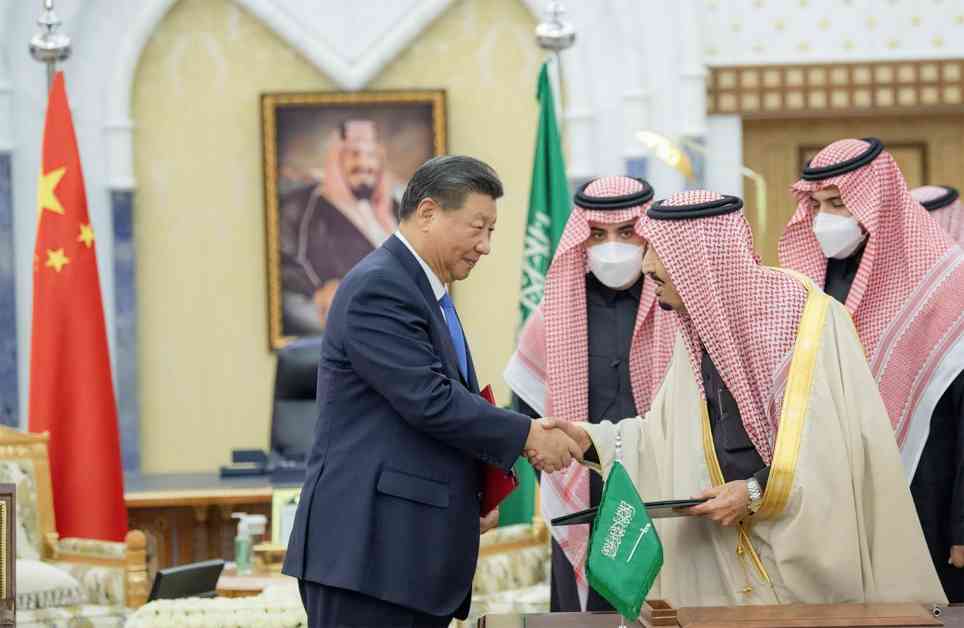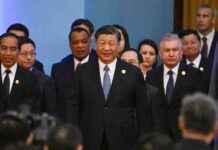China and Saudi Arabia have seen a significant increase in bilateral trade in recent years, with China emerging as the largest market for Saudi oil since 2013. Last year, China accounted for 21.7 percent of Saudi Arabia’s oil exports, highlighting the growing economic ties between the two nations. Despite China’s overall global trade surplus, it consistently runs a trade deficit with Saudi Arabia, underscoring the importance of their trade relationship.
In an effort to strengthen its trade independence and shield itself from potential financial sanctions, China has been working towards settling its oil trade with Saudi Arabia in renminbi (RMB) instead of U.S. dollars. This strategic move not only aims to protect China’s trade from external pressures but also has the potential to disrupt the global market for oil. While the RMB currently represents only 7 percent of total global trade payments, its usage in China’s goods trade has been steadily increasing, reaching 23 percent. This growth is significant and indicates China’s commitment to enhancing the role of the RMB in international trade.
The exact extent to which China-Saudi oil trade is settled in RMB remains uncertain, as precise statistics are not readily available from the People’s Bank of China (PBOC) or Saudi Arabia’s central bank. However, based on the RMB’s share of usage in Chinese goods trade and the volume of Saudi oil imports, it is plausible that a substantial amount of Saudi oil is already being settled in RMB annually. This potential shift towards RMB settlement could have far-reaching implications for the global oil market and financial landscape.
By reducing its reliance on the U.S. dollar for oil trade with Saudi Arabia, China aims to secure a more stable and reliable energy supply, even in the face of potential crises or extreme scenarios. This strategic move aligns with China’s broader efforts to diversify its trade relationships and reduce its exposure to external risks. Given the interconnected nature of the global economy, China’s leaders recognize the importance of safeguarding their economy against potential disruptions in the international financial system.
In line with these objectives, Chinese President Xi Jinping has actively promoted the use of RMB settlement in oil and gas trade with Saudi Arabia. During his visit to Riyadh in December 2022, Xi emphasized the utilization of the Shanghai Petroleum and Natural Gas Exchange platform for RMB settlement and proposed currency swap cooperation and digital currency initiatives. The establishment of a robust RMB settlement framework with Saudi Arabia would not only enhance China’s trade resilience but also contribute to the broader internationalization of the RMB.
Saudi Arabia, for its part, has shown openness to accepting RMB as a payment currency, recognizing the potential benefits of diversifying its foreign exchange reserves and strengthening its economic ties with China. As the fifth most-used international payment currency and the second-largest trade financing currency, the RMB’s growing prominence in global trade finance underscores its increasing relevance in the international financial system. The continued expansion of RMB usage in trade and investment further solidifies China’s position as a key player in the global economy.
The development of a non-dollar oil trading architecture between China and Saudi Arabia holds significant implications for both countries’ economic cooperation and financial stability. By reducing their dependence on the U.S. dollar and promoting RMB settlement in oil trade, China and Saudi Arabia are paving the way for a more diversified and resilient trade relationship. The potential growth of RMB-denominated trade and investments between the two nations could foster greater economic integration and mutual benefits.
As China and Saudi Arabia deepen their financial cooperation in RMB settlement, the implications extend beyond trade to encompass investment, infrastructure development, and strategic partnerships. The reciprocal nature of their economic ties creates a self-sustaining cycle of trade and investment, with RMB serving as a common currency for transactions and exchanges. The alignment of their economic interests opens up new opportunities for collaboration and growth, benefiting both countries in the long run.
In conclusion, the strengthening of RMB settlement in China-Saudi oil trade marks a significant step towards enhancing trade independence and financial resilience. By diversifying their trade relationships and reducing their exposure to external risks, China and Saudi Arabia are laying the groundwork for a more stable and sustainable economic partnership. The growing prominence of the RMB in international trade and finance underscores China’s increasing influence in the global economy and its strategic efforts to secure its trade interests. As the world economy continues to evolve, the role of the RMB in global trade and investment is likely to expand, shaping the future of international finance and commerce.

















